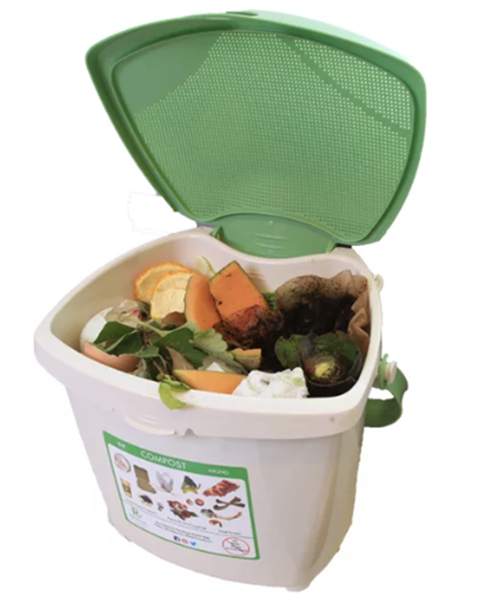California's Short-Lived Climate Pollutant Reduction Strategy

SB 1383
California's Short-Lived Climate Pollutant Reduction Strategy (SB 1383) went into effect on January 1, 2022. The law aims to reduce climate change contributing emissions, like methane, by keeping food and other organic compostable materials out of landfills. In Alameda County, SB 1383 has been implemented and is enforced under the Organics Reduction and Recycling Ordinance (ORRO). A copy of the ORRO can be viewed down below in the "Ordinances & Agreements" tab.
Businesses, nonprofits, institutions, schools, multi-family properties, and residents must all comply with specific rules. Some businesses, like grocery stores, must recover and donate their surplus edible food. Check out the tabs below to learn more.
Sb 1383 Regulations, Resources, & Help
What is SB 1383?
To learn more about SB 1383, check out the information below provided by CalRecycle and Waste Management of Alameda County (WMAC).
Regulations & Jurisdictional Responsibilities
Resources & Help
If you need help complying with SB 1383, check out StopWaste's SB 1383 Resources & Help homepage below as well as the SB 1383 rules overviews.
Rules Overview
Organics in the Landfill...So What?
As compostable materials, or organics, decompose in landfills, they produce methane, a powerful greenhouse gas. Food waste makes up about a quarter of municipal solid waste in landfills, and because food decomposes quickly, it causes about 58% of methane emissions from landfills. Visit the link below to learn why it is important to keep organics out of landfills and sort waste properly.
Learn more about WMAC organics recycling.
Edible Food Recovery
Please visit the following links to view a directory of Edible Food Recovery Organizations, review SB 1383 requirements for food recovery organizations and services, review resources for compliance, find out if your site is covered under the law, learn about enforcement, and read through relevant FAQs.
Reports & Complaints
Report SB 1383 violations and file noncompliance complaints through StopWaste's Noncompliance Complaint Form. Your complaint will be kept anonymous unless you choose to submit contact information. Contact information allows StopWaste to follow-up in the event that additional information is needed.
Please direct all questions about the form to rules@stopwaste.org or call (510) 891-6575 and leave a message to receive a call back.
Ordinances & Agreements
Click the links below to read through relevant City and regional ordinances and relevant agreements.
Waste Sorting & Prevention
What Goes Where?
Check out the sorting guides below and view StopWaste's Re:Source search tool to find out where specific items might go.
Alameda County Waste Characterization Study
Have you ever wondered what kinds of waste Alameda County produces? Check out the Alameda County 2023-24 Waste Characterization Study to find out.
Waste Prevention
It's not only important to sort waste correctly but also to take steps to reduce waste when possible. Check out the resources below for tips on how to prevent excess waste and get involved with community composting.
Why Prevent Waste? Why Keep Food Waste out of Landfills?
As compostable materials, or organics, decompose in landfills, they produce methane, a powerful greenhouse gas. Food waste makes up about a quarter of municipal solid waste in landfills, and because food decomposes quickly, it causes about 58% of methane emissions from landfills. Visit the link below to learn more about why organic materials don't belong in the landfill.
Contamination Minimization & Enforcement
Contamination Minimization
Waste Management of Alameda County uses Smart Truck® technology to identify contamination. Check out the links below to learn more about the Smart Truck® program and technology.
Enforcement
Learn more about StopWaste's and CalRecycle's SB 1383 enforcement protocol.
If you have received a violation or citation from StopWaste, please visit the links below to proceed. If you received a violation but have an alternative arrangement for waste collection, such as self-hauling or back-hauling, please complete the Certification of Recycling Service form. If you lack necessary physical space for containers or generate minimal amounts of compostable or recyclable material, you may qualify for a waiver.
For any additional questions, contact StopWaste's Ordinance Helpline at (510) 891-6575 or rules@stopwaste.org.
Waivers
Waiver Eligibility
The Organics Reduction and Recycling Ordinance (ORRO) requires that all Alameda County accounts subscribe to compost and recycling collection services through their jurisdictionally approved hauler if they do not have an approved waiver or alternative service set up. Commercial businesses in Alameda County may be eligible for one of two different types of waivers:
- De Minimis or Minimal Generation Waivers are for businesses who generate a minimal amount of compostable and or recyclable materials. Thresholds are listed on StopWaste's Waiver Application Form. Only businesses are eligible.
- Physical Space Waivers are for businesses with physical space constraints that prohibit the addition of recycling and/or compost containers. Both businesses and multifamily properties are eligible.
Alternative Service Arrangements
If you have an alternative arrangement for recycling and/or compost service, such as self-hauling, back-hauling, sharing service with a neighboring business, or use of a third-party recycler, be sure to request a Certification of Recycling Service.